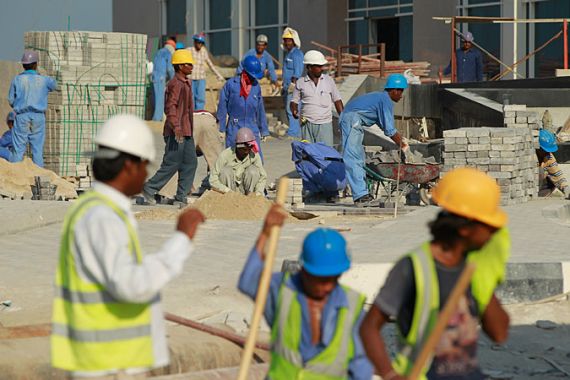UN agency welcomes ‘milestone’ in Qatar’s kafala labour reforms
The measure removes exit visas for hundreds of thousands of domestic workers left out of earlier reforms.

Qatar said on Thursday that it had scrapped restrictions on leaving the country for nearly all migrant workers as part of reforms in the run-up to the 2022 World Cup.
The measure removes exit visas for hundreds of thousands of domestic workers left out of earlier reforms – mainly from Asian nations such as Nepal, India and the Philippines – whom rights groups said were left open to abuse by being excluded.
Keep reading
list of 3 itemsDubai’s striking workers in their own words
Modi gets top UAE honour amid Kashmir lockdown
“Now a domestic worker has the right to enter and exit the country without their employer’s permission,” labour ministry under-secretary Mohamed al-Obaidly told AFP news agency.
“We are working on a complete system of [labour] legislation.”
The announcement came after Human Rights Watch published its annual report on Tuesday, saying Qatari reforms “have not gone far enough, and implementation has been uneven”.
Unions and activists have documented labour exploitation, dangerous conditions and deaths of workers building stadiums and infrastructure for two football events – both the 2018 World Cup in Russia and the upcoming event in Qatar.
|
|
The Gulf state has been implementing a host of concrete measures to protect all expatriate workers ahead of the 2022 edition of the tournament.
“It’s a great milestone in the ambitious labour reform agenda of the state of Qatar,” Houtan Homayounpour, head of the Qatari office of the International Labour Organization (ILO), a United Nations agency, told Al Jazeera.
Qatar in 2018 eliminated exit visas for many foreign migrant workers. But the reform did not apply to domestic workers, government and public institution staff, oil and gas sector workers, and those employed at sea and in agriculture.
Homayounpour said that employers will no longer have the opportunity to tell workers “yes” or “no” and that “they [workers] can get up and go to the airport and leave”.
“The government needs to be recognised and applauded for this,” Homayounpour added.
Under the new system, exit permit requirements will remain in place for members of the armed forces and for a limited number of workers in key company posts.
“Employers have the right to identify a maximum of 5 percent of their workforce whose exit from Qatar will continue to require prior approval,” a government statement said.
‘Fostering exploitation’
A “kafala” sponsorship system for workers is common in Gulf states with large foreign communities.
In gas-rich Qatar, it requires workers to obtain employers’ consent before changing jobs, which activists say fosters exploitation. Qatar has only 300,000 citizens of its own among a population of 2.7 million.
In 2017, the ILO dropped a case against Doha over its treatment of foreign workers after it committed too-far-reaching reforms.
Alongside the exit permit reforms, Qatar has imposed a minimum wage and established dispute resolution committees to fast track complaints of unpaid salaries.
It also says work is under way to enable workers to change employers more easily.
Qatar announced in October that it would remove the requirement for some workers to obtain employers’ permission before changing jobs.
Doha is also due to introduce a permanent minimum wage this year to replace the current temporary floor of just $200 per month.